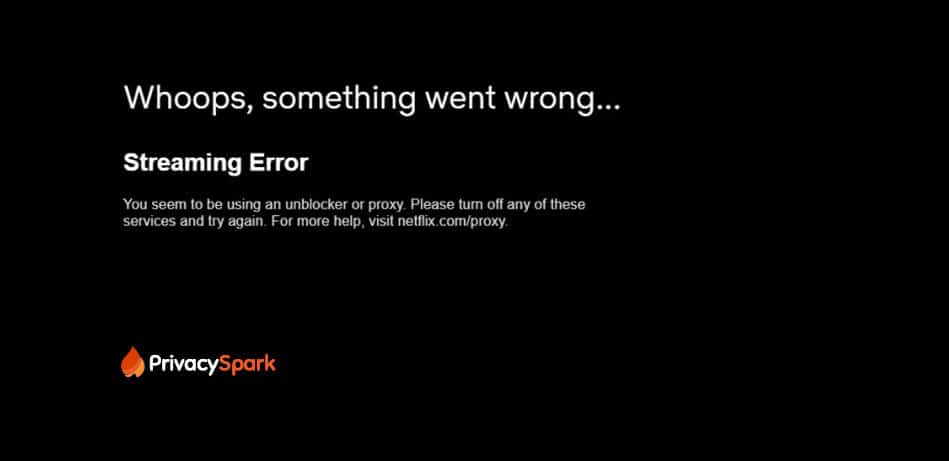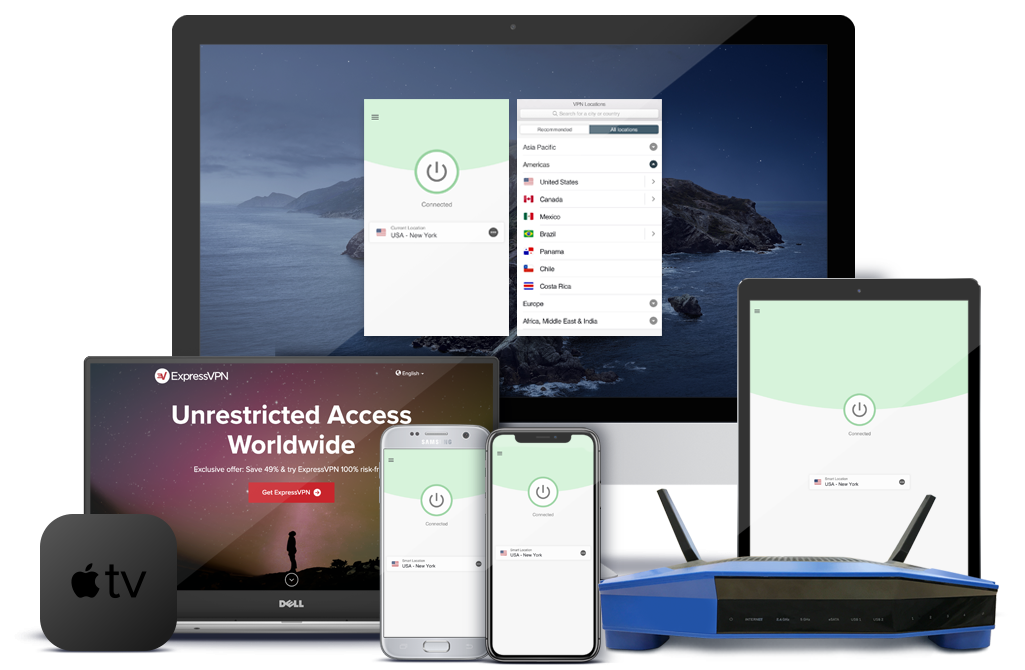14th January 2016. That was the day Netflix declared war on all unblocking software. A lot of VPNs surrendered in the subsequent weeks but there are others that stood firm and fought back. These were the ones with enough resources. They could afford to deploy new soldiers (servers) when the existing ones were felled by Netflix.
IPVanish was one of those that fought back. And for more than three years the war between them and Netflix raged on. Well, it turns out that Netflix has finally won. IPVanish fall from glory has been gradual. First, they vanished from the frontline. They stopped being included on the list of best VPNs to unblock Netflix and started appearing only as honorable mentions.
And now, at last, they have accepted defeat. It’s not official yet and I don’t expect that they will release a statement confirming the same. That would not go well with their loyal supporters. Especially since there are a number of other VPNs that still remain strong in the battle.
But all you have to do is read between the lines. The evidence is there.
If you are looking for a VPN the unblocks we recommend that you give ExpressVPN a try.

- Unconditional 30-day money-back guarantee
- No activity logs and no connection logs
- Easy-to-use apps for all devices
Proof that IPVanish No Longer Works with Netflix
Just the other day, IPVanish published an article on their site on how to use IPVanish split-tunneling to access Netflix.
Just like the name suggests, this is a technique that allows you to split your internet traffic in two ways. Some of the traffic will be transmitted directly through your ISP meaning it will not be encrypted while the other traffic is transmitted through the VPN servers.
To put it into perspective, IPVanish wants you to configure Netflix traffic to go through your ISP so that the streaming service does not realize that you are using a VPN. Then, you can send your other traffic through their servers where it will be encrypted before being sent to the web.
What does that tell you? Netflix is now able to detect all connections coming from IPVanish servers and block them. Right?
On the upside, this is a great way to continue watching Netflix while ensuring that your personal information remains protected against hackers. On the downside, you will only have access to your region’s version of Netflix.
If you try using the IPVanish servers to unblock another country’s Netflix library, then you will be met with the streaming error.

And now to another question that is probably boggling you. Is this war necessary?
Why does Netflix block VPNs
The simple answer is because VPNs help their users to bypass Netflix geo-restrictions and thus allowing them access to content that would normally be unavailable in their region. Which then raises another question.
Why does Netflix block content? And there are three reasons for that.
- The geo-restrictions were already in place – See, Netflix does not own most of the content on its platform. What they do is approach movie studios, television networks, and independent producers and purchase the rights to stream their content.
Due to varying content licensing and copyright laws in each country, the content owners sometimes opt to restrict the viewing of their movies and shows to one region only.
When Netflix finally acquires the rights to stream this content they have to make sure the geo-restrictions are respected or otherwise they could be sued for breach of contract.
- Another streaming service already owns the rights to stream the content in that region – For instance, Netflix may have the rights to stream a movie in the US but then Prime Video outbids them in getting the rights to stream the same movie in Australia.
Now, the movie will be available in the US Netflix library but blocked in Netflix Australia.
- The show or movie has no demand in a country – If this is true, then there is no need for Netflix to spend money purchasing the rights to stream that movie in the region.
- The content goes against a country’s laws and regulations – A good example is when they had to block an episode of the comedy show, Patriots Act, in Saudi Arabia because their government claimed it violated their country’s cybercrime laws.
The Bottom Line: Netflix blocks VPNs because they give their users access to restricted content which could cause friction between the streaming giant and their partners.
The use of VPNs could be advantageous for Netflix but not so much for their partners
A critical analysis of the situation will reveal that regardless of whether you use a VPN or not Netflix still makes money since you need to pay a subscription fee to access the platform. They can even choose to exploit the situation and save money.
Take this scenario for example.
Black Panther is available on Netflix US but cannot be viewed on Netflix Australia. To make the movie available to their Australian audience then Netflix would have to purchase the rights to stream it in the country. Of course, that is assuming streaming service does not already own the rights to stream the movie in the region.
However, if the majority of the people in Australia are using a VPN to access the Netflix US then they will already have watched Black Panther eliminating the need for Netflix to buy the right to stream the movie in the region.
The content owners, on the other hand, do not get any gains when their content is viewed outside the set borders.
How does Netflix block VPNs
It’s quite simple but for you to understand you first need to know how VPNs are able to bypass the Netflix geo-restrictions.
Every time you connect to the internet, your device is assigned an IP address. This is a unique identifier that contains the name of your ISP and your geolocation. When Netflix receives your connection request, it first looks at your IP to determine where you are connecting from and then you will be directed to your respective country library.
This is where the VPNs come in. Instead of your connection request being sent directly to Netflix it is first passed through a VPN server in a location of your choice. Here, your original IP will be discarded and a new one allocated to you bearing the location you chose.
Now when the connection request reaches Netflix they will be tricked into thinking you are in this new location.
There is just one problem, all the VPNs including IPVanish use shared IP addresses. This means that a single IP address will usually end up being used by multiple users. This is excellent for anonymity because it’s impossible to pin the activities of the IP address to one user.
However, it’s also the VPNs’ undoing because it is how Netflix flags them down. The streaming giants have set up detection algorithms that identify when one IP address is being used for multiple connections and will consequently block all IPs within that range.
Why has IPVanish stopped unblocking Netflix?
Since they have not come out officially on the matter I can only speculate on the matter. It is no longer economically viable for them to continue unblocking the service.
The thing is that every time their IP addresses are blacklisted, then the VPN company either has to add new addresses or configure a new server that works. All of which need financial and human resources.
Since Netflix is always advancing their detection algorithms, I think it may have gotten to a point where they could flag down IPVanish connections almost immediately after being set up making it impossible for the VPN vendors to continue adding new servers.
They may have then decided to instead use those resources to improve other aspects of their product.
For instance, it is one of the best-recommended solutions for P2P sharing and further improvements could see the VPN become the number one recommended solution.
IPVanish has also stopped working with Amazon Prime Video and Hulu
It seems the VPN Vendor has entirely given up on unblocking all the popular streaming services. At least for the moment.
While Netflix is the undisputed king of video-on-demand streaming, Prime Video and Hulu are also coming up really well and the ability to unblock restricted content on any of the two is an important performance metric for VPNs.
However, just like Netflix, both Prime Video and Hulu have set up detection algorithms to block VPN connections. Therefore using the same criteria we used for Netflix, it’s safe to assume that IPVanish can no longer unblock the two streaming services.
Here is a guide on how to use IPVanish split-tunneling to stream Prime Video and this other one is for Hulu.
Conclusion: Will IPVanish ever start unblocking Netflix again?
Again I can only speculate. Even without the unblocking feature IPVanish is still a solid VPN and am certain they will still continue adding new subscribers.
But here is a fun statistic. According to research conducted by Go-globe 50 percent of the people admitted that the top reason for purchasing a VPN is for unblocking entertainment content while only 31 percent used VPNs to safeguard their online anonymity.
If IPVanish cannot bypass the geo-restrictions imposed by the major streaming services then they will be missing on a very big market.
My take is they are currently on the drawing table trying to find new methods of unblocking these streaming services without being detected. But if it was that easy, then every VPN would be doing it.
Whether they succeed or not time will tell. But as it stands, Netflix has had the last laugh.


